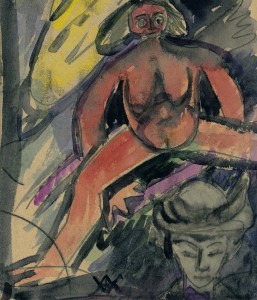«L’art est d’abord la conscience du malheur, non pas sa compensation.»
Maurice Blanchot. L’espace litteraire
Art exists only when it inquires about itself. What does inquiry mean? To inquire means to return. With each work, with each production, art returns to the question of what it really is. Each work of art is considered an answer to this question, because it confirms the reality of the present, the existence of art in the here and now. But in the same moment, the event of producing this art becomes history and destroys any assurance of reality, inasmuch as only a shadow of the artist’s intention remains, while the intention itself has disappeared into the past.
This endless return into uncertainty stands at the very forefront of an artist’s work. It is a return to that which preceded the outward appearance.
Art suspects the conventional, everyday things that surround it of distorting the picture of the world, and accuses them of concealing something very important that might impart coherence and sense to the images and stories that arise. In its turn, everyday conventionality reciprocates by forcing art to adapt to the censorship of contemporary demands, to seek out and wait for vindication by scholarly criticism, and to be “topical”.
When modernity turns to the idiom of art, it entangles itself in uncertainty. Art casts doubt not only on modernity’s knowledge of the world and methods of organizing this knowledge, but also on its very intention of learning about itself. It forces modernity to discuss and account for the existing system of values.
Culture labels itself “contemporary” and calls its time “the present”. It attempts to provide a full description of reality in its texts and tries to protect these texts from the possibility of diverging interpretations by investing them with at least the semblance of truthfulness and authenticity. Art, too, encompasses many texts and images. But these texts are conflicting. They do not guarantee truth or verity in their depiction of the world. Moreover, art warns proponents of diverging interpretations against coming to hasty agreements concerning what today seems to be true.
To inquire about oneself means to not rush into a contract with the establishment and to avoid having one’s speech turned into a mere translation of texts concerning politics or the economy. Inquiry means distrusting such translation. It means learning to forget the norms of public ethics and to free oneself from obligations to the history of art, propriety, desires or injunctions. It means refusing to agree with texts that guarantee new art (and all of modernity) that it will someday be displayed in a museum, where the culture of “eternal values” collects its materials.



